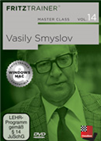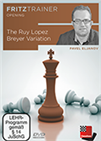Close fights
 Smyslov cultivated a clear positional style and even in sharp tactical positions often relied more on his intuition than on concrete calculation of variations. Let our authors introduce you into the world of Vasily Smyslov.
Smyslov cultivated a clear positional style and even in sharp tactical positions often relied more on his intuition than on concrete calculation of variations. Let our authors introduce you into the world of Vasily Smyslov.The Ukrainian Championships took place in Kharkiv on 8-17 December 2021.
The presentation of the country’s best players turned to be far from optimal this time, with only four of the country’s top ten participating in the open event, while in the women’s tournament there was only one player from the top ten, IM/WGM Inna Gaponenko.
Technically, tournaments were nicely organized in the library of the Yaroslav Mudryi National Law University. It is well known that Kharkiv “Law Academy” continues to be a very important organizational chess centre in Ukraine, which has been so for many decades now, with their team often winning national club championships.
The fight in the open championship was very close. After 7 of 9 rounds, four players were tied on 4 points, two had 3½ points and four participants were on 3 points. So at this point literally no one had yet lost chances for a medal.
Eventually, Grandmaster Andrei Volokitin clinched first place by winning both his games in the two final rounds. I annotated these victories.
Select an entry from the list to switch between games

Andrei Volokitin
Volokitin became the Ukrainian Champion for the third time in his career. His previous successes were in 2004 and 2015. The grandmaster from Lviv appears to be the first player ever to win Ukrainian championships in three different decades! Earlier this year, playing on the second board, he showed the best performance (6/8) for the national team which surprisingly won the European Team Championship. It’s also worth mentioning that in six classical games against the young Magnus Carlsen, played in the period 2004-2008, Volokitin scored overwhelmingly: +4 =2.
Final standings - Open
| 1 |
10 |
GM |
Volokitin Andrei |
UKR |
2677 |
6,0 |
0,0 |
3 |
26,25 |
| 2 |
3 |
GM |
Kryvoruchko Yuriy |
UKR |
2685 |
5,5 |
0,0 |
3 |
22,50 |
| 3 |
8 |
GM |
Shevchenko Kirill |
UKR |
2655 |
5,0 |
1,0 |
2 |
22,50 |
| 4 |
6 |
GM |
Moiseenko Alexander |
UKR |
2597 |
5,0 |
0,0 |
2 |
21,25 |
| 5 |
2 |
GM |
Onyshchuk Volodymyr |
UKR |
2620 |
4,0 |
3,0 |
3 |
16,75 |
| 6 |
7 |
GM |
Vysochin Spartak |
UKR |
2505 |
4,0 |
2,0 |
2 |
18,50 |
| 7 |
5 |
GM |
Kuzubov Yuriy |
UKR |
2652 |
4,0 |
2,0 |
1 |
17,50 |
| 8 |
9 |
GM |
Kravtsiv Martyn |
UKR |
2604 |
4,0 |
1,5 |
2 |
17,25 |
| 9 |
4 |
GM |
Omelja Artem |
UKR |
2509 |
4,0 |
1,5 |
1 |
18,50 |
| 10 |
1 |
IM |
Bakhmatsky Vladislav |
UKR |
2432 |
3,5 |
0,0 |
1 |
15,50 |
The women’s championship has been somewhat surprisingly but deservedly and convincingly won by WGM Kateryna Dolzhykova, who repeated her 2011 success.
Below is her crushing Sicilian win from the seventh round.

Kateryna Dolzhykova
Silver and bronze medals were taken by WGM Olga Babiy and WIM Olena Martynkova, respectively. Both of them scored 5½/9, half a point behind the winner. The rating favourite and the only actual national team member in the tournament, Inna Gaponenko, can’t be happy with her 5/9 result. Regardless, it can be said with confidence that the Ukrainian Chess Federation should do more to attract the country’s best players to the women’s championship.
Final standings - Women’s
| 1 |
8 |
WIM |
Dolzhykova Kateryna |
UKR |
2161 |
6,0 |
0,0 |
5 |
25,25 |
| 2 |
3 |
WGM |
Babiy Olga |
UKR |
2259 |
5,5 |
1,0 |
4 |
23,25 |
| 3 |
10 |
WIM |
Martynkova Olena |
UKR |
2180 |
5,5 |
0,0 |
3 |
21,25 |
| 4 |
5 |
FM |
Berdnyk Mariia |
UKR |
2307 |
5,0 |
1,5 |
4 |
20,25 |
| 5 |
7 |
IM |
Gaponenko Inna |
UKR |
2347 |
5,0 |
1,0 |
2 |
19,00 |
| 6 |
1 |
WGM |
Doluhanova Evgeniya |
UKR |
2264 |
5,0 |
0,5 |
3 |
22,25 |
| 7 |
9 |
|
Tsirulnik Maritsa |
UKR |
2054 |
4,5 |
1,0 |
3 |
19,50 |
| 8 |
4 |
WIM |
Rakhmangulova Anastasiya |
UKR |
2174 |
4,5 |
0,0 |
4 |
17,00 |
| 9 |
6 |
WIM |
Petrova Irina |
UKR |
2141 |
2,0 |
1,0 |
1 |
7,25 |
| 10 |
2 |
|
Lomakina Anzhelika |
UKR |
2009 |
2,0 |
0,0 |
1 |
10,00 |
Highlights
The last section of this report will consist of selected annotated games from the open championship. Let’s begin with the encounter between the players who took silver and bronze medals — rating favourite Yuriy Kryvoruchko and the rising star, who is essentially the chess hope of Ukraine, Kirill Shevchenko.
In his eventually successful game against Volodymyr Onyshchuk, Kryvoruchko employed a curious opening idea.
Shevchenko’s draw versus Yuriy Kuzubov was a quite well-played game by both sides, with some curious moments.
 Pavel Eljanov explains in depth what Gyula Breyer already saw in 1911 and what became an opening choice of the likes of Kasparov, Kramnik, Anand or Carlsen. The Breyer Variation, which is characterised by the knight retreat to b8.
Pavel Eljanov explains in depth what Gyula Breyer already saw in 1911 and what became an opening choice of the likes of Kasparov, Kramnik, Anand or Carlsen. The Breyer Variation, which is characterised by the knight retreat to b8.
Kirill Shevchenko
Three more games were selected since all of them included interesting opening developments.
Select an entry from the list to switch between games
I have also analysed a purely tactical fragment.
Links
























